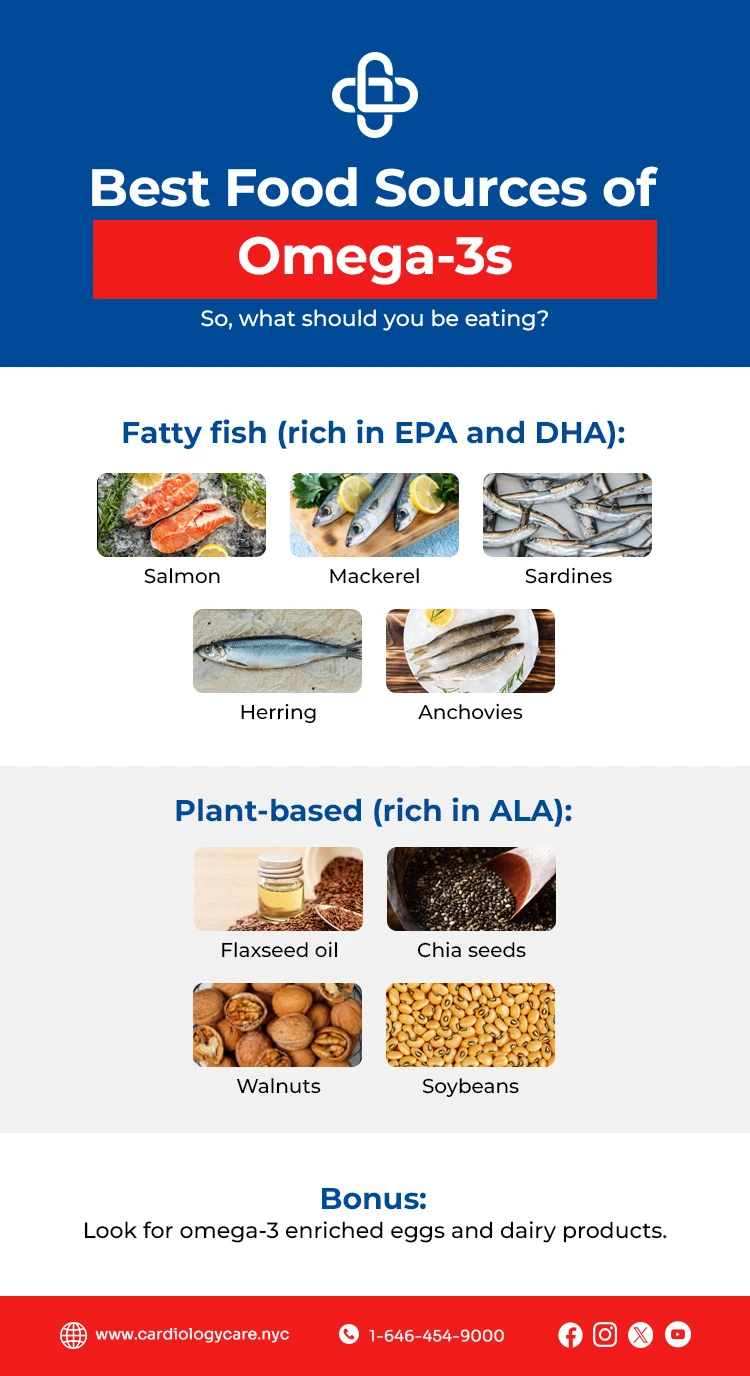You’ve probably heard omega-3 fatty acids are good for your heart—but what do they really do, and do you need to take a supplement to get the benefits? Omega-3s are essential fatty acids that play a key role in keeping your heart healthy. But when it comes to how they work, where to get them, and whether supplements are necessary, things get a little more nuanced.
Table of contents
What Are Omega-3 Fatty Acids?
Omega-3s are a type of polyunsaturated fat, and your body can’t make them on its own. That means you have to get them from food or supplements.
Here are the main types that matter for heart health:
- Eicosapentaenoic acid (EPA): Found mostly in fatty fish; plays a role in reducing inflammation and supporting heart function.
- Docosahexaenoic acid (DHA): Also found in fish, it’s crucial for brain and cardiovascular health.
- Alpha-linolenic acid (ALA): A plant-based omega-3 found in things like flaxseeds and walnuts. Your body can convert some ALA into EPA and DHA, but not very efficiently.
Omega-3 Fatty Acids and Heart Health: What the Science Says
How do omega-3s help the heart?
Decades of research suggest omega-3s support cardiovascular health in several ways:
- Lowering triglycerides, which helps reduce the risk of heart disease.
- Reducing inflammation in blood vessels.
- Mildly lowering blood pressure.
- Reducing risk of arrhythmias, or irregular heartbeats.
- Stabilizing plaque in arteries to reduce the chance of a heart attack.
They can be helpful in both preventing heart disease (primary prevention) and improving outcomes in conditions like heart failure or coronary artery disease.
Best Food Sources of Omega-3s
So, what should you be eating?
Fatty fish (rich in EPA and DHA):
- Salmon
- Mackerel
- Sardines
- Herring
- Anchovies
Plant-based (rich in ALA):
- Flaxseed oil
- Chia seeds
- Walnuts
- Soybeans
Bonus: Look for omega-3 enriched eggs and dairy products.
Fish Oil Supplements: Benefits and Cautions
Can’t stand fish? That’s where fish oil supplements come in. They’re a convenient way to get EPA and DHA, especially if your diet is low in seafood.
Benefits of fish oil:
- Reduces triglycerides
- May lower blood pressure (a little)
- Helps combat inflammation
Potential risks:
- Increased bleeding risk at high doses
- Digestive side effects like burping or indigestion
- Quality varies: Not all brands are created equal
For pregnant women:
Make sure the supplement is mercury-free and meets dosage guidelines. Omega-3s support both maternal heart health and fetal brain development.
What to Know About Fats and Heart Health
Not all fats are created equal.
- Omega-3s (polyunsaturated fats) = Very heart-friendly
- Monounsaturated fats (olive oil, avocado) = Also great for your heart
- Saturated fats (butter, red meat) = Best to limit
Replacing saturated fats with unsaturated fats, especially omega-3s, can improve cholesterol levels and reduce heart disease risk.
When to Consider Omega-3s and How to Monitor Heart Health
You might benefit from adding more omega-3s if you have:
- High cholesterol or elevated triglycerides
- High blood pressure
- A family history of cardiovascular disease
Work with your healthcare provider to:
- Discuss if omega-3s should be part of your heart-health plan
- Get regular heart health screenings and lipid panels
- Track your intake via diet or supplement logs
If you’re unsure where to start, our team at Cardiology Care NYC is here to guide you through personalized nutrition and supplement plans tailored to your cardiovascular risk profile. A cardiology consultation can help determine whether adding omega-3s is appropriate for your specific needs.
Conclusion
Omega-3s are one of the most well-studied nutrients when it comes to heart health. From lowering inflammation to balancing blood lipids, they can be a powerful ally in your cardiovascular toolkit. Still, they’re not a silver bullet. Your best bet? Combine omega-3s—from fish, plants, or high-quality supplements—with a healthy diet, regular exercise, and routine checkups.
Looking for expert advice? Cardiology Care NYC offers comprehensive heart health evaluations and Cardiac screening services to help you make smart, science-backed decisions for your heart.
Frequently Asked Questions
Can omega-3 fatty acids reverse existing heart disease?
No, but they may slow its progression and reduce the risk of future heart events.
How long does it take for omega-3s to affect heart health?
Some effects show in 4–8 weeks; long-term benefits develop over months.
Do omega-3s interact with common heart medications?
Yes, especially blood thinners—consult your doctor before combining them.
Are krill oil and algae oil as effective as fish oil for heart health?
They can be, though fish oil is more extensively studied.
Can children or teens take omega-3s for future heart health?
Yes, they support early heart, brain, and vision development.
Disclaimer
This blog is for informational & educational purposes only and does not intend to substitute any professional medical advice or consultation. For any health-related concerns, please consult with your physician, or call 911.

